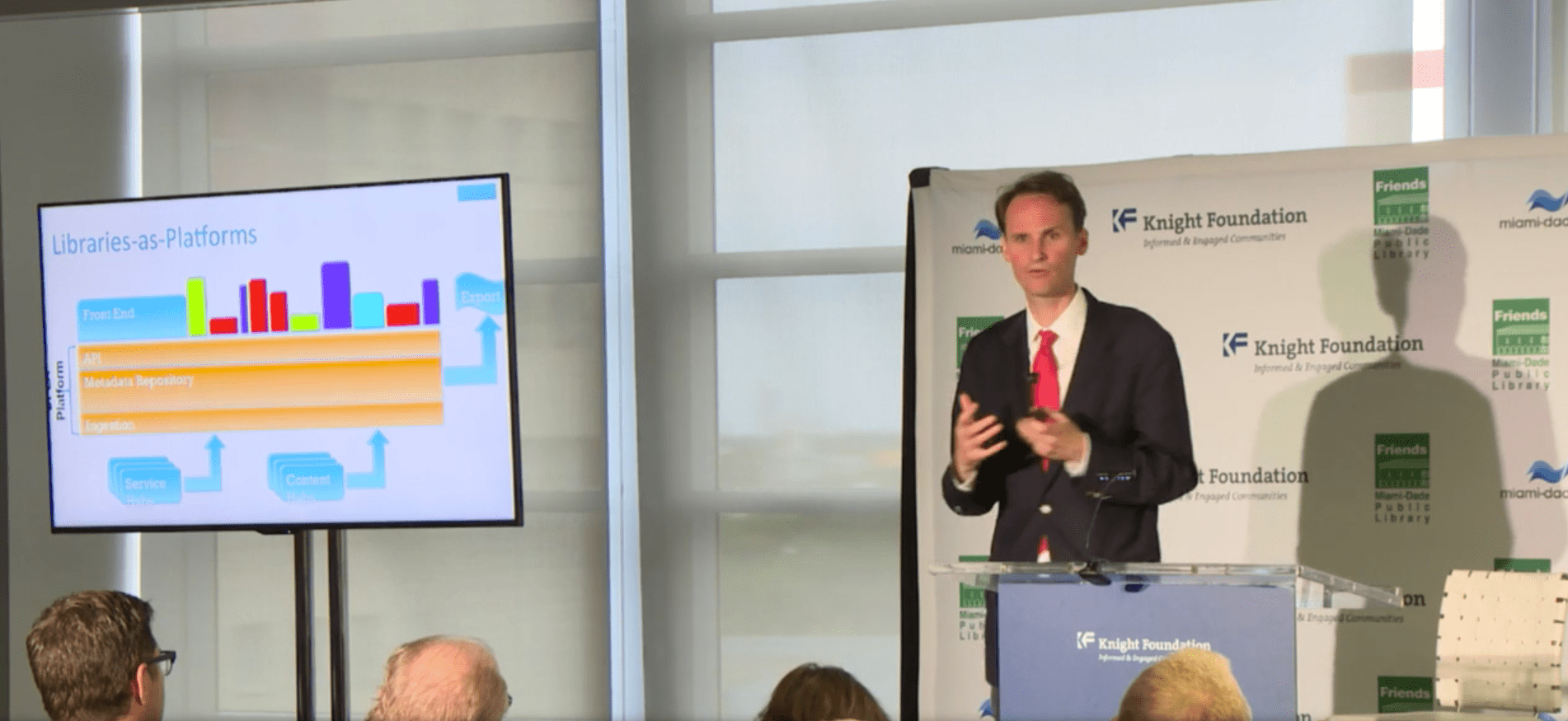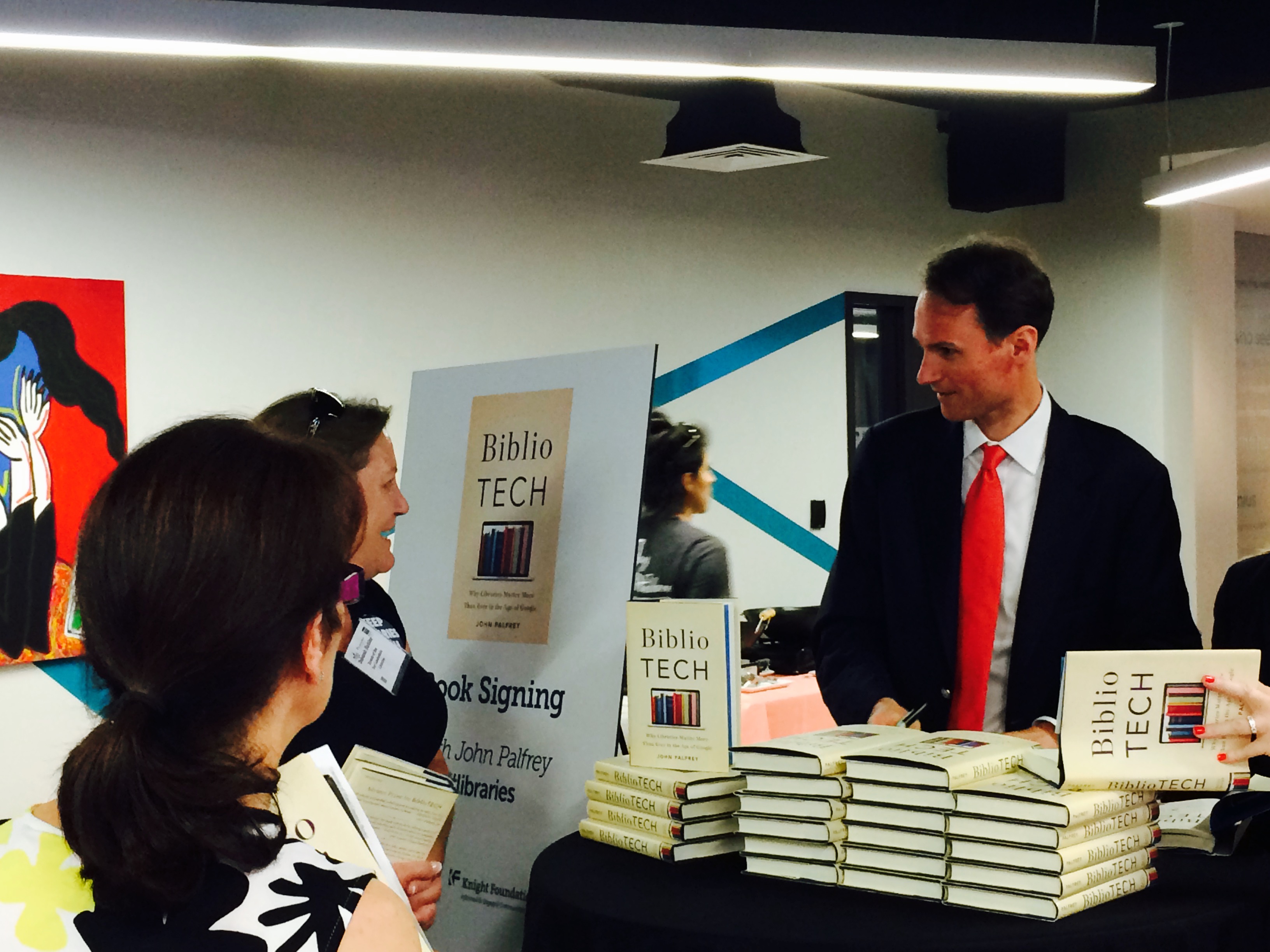
Palfrey: The library of the future must be digital + physical
At a time every smartphone offers fast access to an immeasurable pool of information, many question the need for physical libraries. But public libraries are far more than free providers of information, which alone is an essential service for communities and democracy, argues author John Palfrey in his new book Bibliotech: Why Libraries Matter More than Ever in the Age of Google.
The challenge ahead — Palfrey suggested Monday night at Miami Dade College’s Idea Center — is to create a hybrid that embraces both the physical and digital formats while updating the role of public libraries in this new information age.
“I wrote this book as a celebration of libraries. The whole point is to make the case for libraries in the digital age,” said Palfrey, speaking before a standing-room-only audience of about 300 at the event sponsored by the Friends of the Miami-Dade Public Library, Miami-Dade Public Library System and Knight Foundation, which funds libraries as part of its mission to promote informed and engaged communities.
“You probably don’t need that argument, but there are too many people who are in positions of authority who do need that argument made. I also think of it as a love letter, a love letter to libraries and to librarians … and maybe a tiny little dose of tough love in that too. I think there’s more that we can do and there’s more that we should do.”
Palfrey underscored the passion libraries bring out by showing pictures of a grassroots demonstration in Miami and a similar action in Kansas City, Mo, in which a group of young people protested library cuts.
“Why do this matter so much? Why should we be taking to the streets and cyberspace to make the case for libraries? I think it’s really simple: I think libraries are essential to a functioning democracy,” said Palfrey, who is chair of Knight Foundation’s board, was vice dean for library and information resources at the Harvard Law School, and is currently head of school at Phillip’s Academy Andover. “Knight Foundation is devoted to creating informed and engaged communities and I cannot think of an institution … more than libraries that have this function in our society.”
He emphasized the point with a picture of the statement, in bold letters, above the entrance door of the Boston Public Library: “Free to all.”
“This picture gives me chills up my spine every time I see it,” he said. “This was erected in the middle of the 19th century and the basic idea was in the middle of our city, in the very center of our civic space, we are going to have a place that is devoted to ensure that everybody regardless of their ability to pay can get access to the information they need, and they didn’t think this way, to be informed and engaged citizens in our community.”
Throughout his talk, Palfrey moved between larger themes and specific, practical concerns.
The former board president of the Digital Public Library of America, Palfrey spoke about the cloud and the need “to have a public option in addition to the private hands that are holding this information.” He addressed issues such as the challenge to have both physical and digital copies of texts; attracting young people into libraries with creative activities; the importance of serendipity in a traditional library experience and the idea of creating a digital variant of this by having virtual shelves. Most importantly, he spoke of aligning the library’s activities to the needs of the community.
Also, in discussing reference books, Palfrey illustrated some of the challenges and opportunities for libraries today. He recalled being at the library working on his book when a number of school kids stream in after school and “one of the kids was doing a research project and I saw him pull out his iPhone and he clicked on Siri and said ‘Siri tell me what ‘terminal velocity’ means.’ And it turns out that Siri had absolutely no clue,” deadpanned Palfrey to great laughter in the room.
“But five feet away there was a reference librarian that I guarantee you could’ve put this kid right in touch with the right book to find out what ‘terminal velocity’ was.”
In fact he gently chided libraries for “radically under-investing in research and development,” calling attention to the fact that some of the great developments in information technology in the last 20 years have not come out of libraries. He noted the success of Google as a search tool, the system of recommendations featured in Amazon and Netflix and even tipped his hat to Wikipedia in spite, he noted, all its “problems and issues.”
“We in libraries have not invested in creating the next great information technology — and the talent is there, the knowledge is there.”
The question and answer period, led by Knight Foundation President Alberto Ibargüen, brought about the need for “the Andrew Carnegie of today” to help libraries be more digital, and the challenge of getting people out of their homes now that so much entertainment and information is available in a private setting.
“People come to physical spaces for good reasons,” he said. “To be with one another, to be social to do interesting things and that combination is exactly what libraries need to do and can do.”
In fact, for all the challenges facing libraries, Palfrey remains an optimist.
“The good news,” he said at one point. “Is that we are at a moment when we are, once again, imagining what libraries could be.”
Fernando González is a Miami-based arts and culture writer. He can be reached via email at [email protected].

Author John Palfrey signed books for guests at the event.
Recent Content
-
Communitiesarticle ·
-
Communitiesarticle ·
-
Communitiesarticle ·


